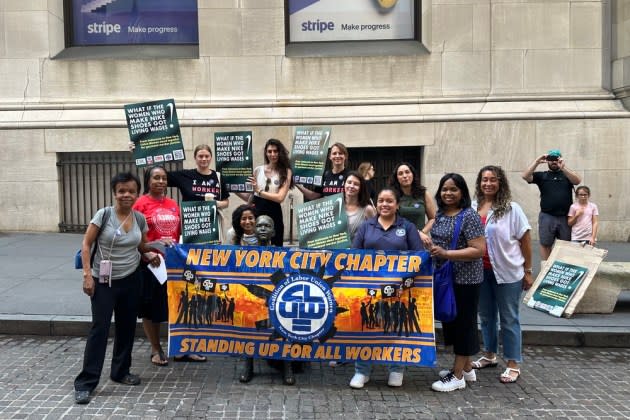US Labor Campaigners Demand Nike Ensure Fair Pay for Garment Workers

Ahead of the Paris Olympics, labor campaigners across the United States urged Nike to just do it when it comes to fair pay in its supply chain.
Led by Global Labor Justice (GLJ) and the Asia Floor Wage Alliance (AFWA), hundreds of protestors rallied in eight cities, including the sportswear giant’s home turf of Portland, Ore., on Tuesday to demand that Nike take responsibility for what they say is the “human rights crisis” that its South and Southeast Asian supply chain workers faced during the pandemic.
More from Sourcing Journal
Former Nike, Adidas Execs Join Oregon's 'Made in Old Town' Project
Armani, Dior Investigated by Italian Watchdog for 'Unfair Commercial Practices'
Nike Says The Shoe Surgeon Built a Counterfeit 'Empire' in New Lawsuit
“To meet the basic needs during Covid, my husband and I were forced to borrow money from relatives and banks, using our belongings as collateral. And until now I am still paying interest on debts,” said Siti Chaerunissa, a Serikat Pekerja Nasional union member who works at a Nike supplier in Indonesia. “We often hear people say that Nike talks about equality. As workers who make high-quality products, we should also be treated as equals.”
In Boston, activists delivered a letter to the Converse All-Star Headquarters urging Nike to negotiate with the garment unions that represent their supply chain workers. In Washington, D.C., a group of allies distributed flyers at the Washington Trade Symposium’s Cocktail Reception demanding the same. In New York City, representatives from the Model Alliance, the Communication Workers of America, the Coalition of Labor Union Women and Americans for Financial Reform waved signs and banners at the New York Stock Exchange Footwear Distributors and Retailers Association’s Supply Chain Summit offering their solidarity.
“Models and garment workers are mostly young women and girls who are all trying to have a voice in their work,” Shaina Danziger, a former model and a member of the Model Alliance’s Worker Council, told Sourcing Journal. “I was proud to help champion the Fashion Workers Act to give models basic rights as workers in New York, and now I’m standing with garment workers across the globe in calling on Nike to pay them their fair share.”
Nike, which did not respond to a request for comment “likes to talk a lot about equality,” added Yolanda Pearson, leader of the Communication Workers of America’s Women’s Committee. “Until it pays the women who make Nike clothing and shoes a decent wage, we know it’s all talk.”
Women do the real work in the factories, sweating for their families, breaking their backs, hurting their hands all to produce Nike apparel deserve to be paid fairly: Roushaunda Williams @UniteHereLocal1 leader in solidarity w/@Nike supply chain workers #NikeInequality pic.twitter.com/bUKsk8nq0R
— Global Labor Justice (@global_labor) July 17, 2024
GLJ and the AAFA, which together with 20 unions representing workers in Nike’s supply chains in Cambodia, India, Indonesia, Pakistan and Sri Lanka, filed an international labor complaint with the Organisation for Economic Co-operation and Development in Washington, D.C., last March, saying that the Swoosh has failed to “make good” on its claims to champion racial and gender equality by meeting workers’ demands. They say that Nike, by initially canceling orders when Covid-19 reared its head, and then drastically reducing production volumes, triggered layoffs, pay cuts and wage theft at its suppliers, the aftershocks which are still being felt today. Beyond that, the groups say that the Adidas rival cannot claim to support gender equality without ensuring that the factories it uses pay their female employees a livable wage.
“Nike makes massive profits from the labor of women garment workers in Asia and by selling the image of women athletes and stars in the U.S.,” said Jacob Horwitz, field director at GLJ, which estimates that a Sri Lankan worker that makes Nike shoes would need to work for 2,000 years to make what Nike CEO John Donahoe earns in a month. “Today, women in the labor movement called on Nike to put its money where its mouth is and pay living wages.”
One thing that’s clear is that the pressure isn’t letting up soon because too much is at stake. Women garment workers in Asia have been “organizing and fighting for decent work” in the supply chains of American companies for years, said Abiramy Sivalogananthan, South Asia coordinator of the AFWA. “When they win, it will be a victory for women everywhere.”
